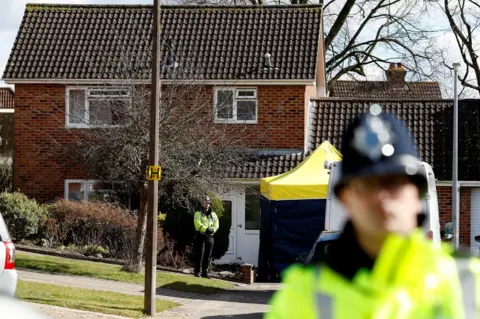Skripal Novichok poisoning attack house roof replaced
 Reuters/BBC
Reuters/BBCThe roof of the home of former Russian spy Sergei Skripal is to be dismantled by military teams in the wake of the Novichok attack.
Detectives believe Mr Skripal and his daughter Yulia first came into contact with the poison when it was sprayed on the property's door handle.
The replacement of the roof timbers is a "precautionary measure".
It will ensure there is no chance of residue contamination from police searches, say Wiltshire Council.
The clean-up at Christie Miller Road, Salisbury, has been taking place ever since they collapsed on 4 March.
The authority has warned neighbours of about four months of disruptions as it replaces the roof timbers.
'Low risk'
Speaking to BBC Radio Wiltshire, Alistair Cunningham, the chair of the recovery coordination group, said: "the whole house had to be searched, including the roof space.
We want to be sure no contamination was taken from the door into the roof space.
It's a timber structure and when it comes to wood it's more difficult to clean. It's easier to remove."
Contractors will cover the house and garage with a "sealed frame", according to a letter written by the council's director of public of health, Tracy Daszkiewicz.
A military team will then dismantle and remove the timbers, before removing them from the site.
"When that work is completed, contractors will move on site to build a replacement roof for the house and adjoining garage."
She said the risk to public health remains "low".
 Reuters
ReutersMr Cunningham confirmed that the house is still privately owned by Sergei Skripal but that he had not yet made clear whether he wishes to return.
The council, he said, would be ready to purchase the house if Mr Skripal decided to sell it: "Our concern is that if this house were sold, that it should be sold for the right reasons, i.e. this is a family home and should remain a family home.
"We have the ability to purchase the property, if it's in the wider public interest to do so."
Mr Skripal, 67, and his daughter - who was 33 years old at the time of the attack - survived the attack which Prime Minister Theresa May said had "almost certainly" been approved by the Russian state.
Wiltshire Detective Sergeant Nick Bailey is also thought to have come into contact with the poison when he searched their home.
Dawn Sturgess, 44, fell ill in Amesbury months after the incident and died in hospital in July after coming into contact with a perfume bottle believed to have been used in the attack on the Skripals and then discarded.
Her partner, Charlie Rowley, 45, was also exposed to the same nerve agent but was treated and discharged.
Two Russian nationals have been accused of travelling to the UK to try to murder Mr Skripal with Novichok.
The two suspects - known by their aliases Alexander Petrov and Ruslan Boshirov - were caught on CCTV in Salisbury the day before the attack.
